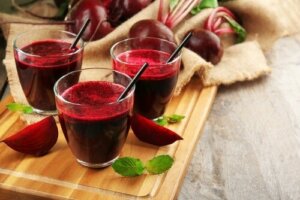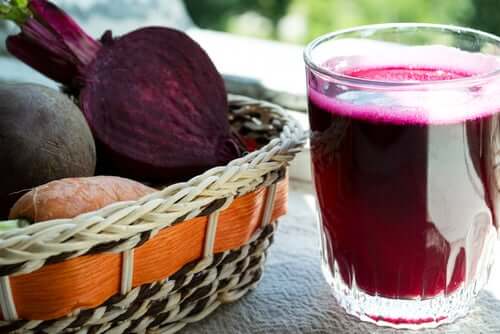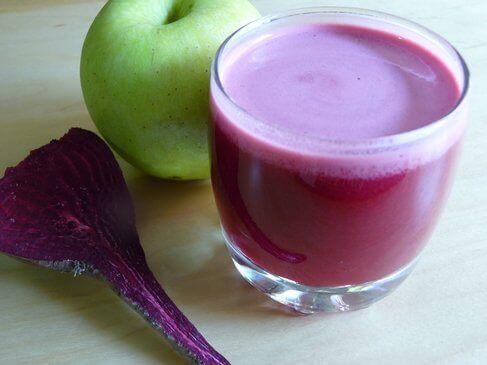Healing the Liver and Purifying the Blood with Beets


Written and verified by psychologist Valeria Sabater
Beets are more than simple vegetables as deep within their bright purple core, lie antioxidants and vitamins that are great for healing the liver and purifying the blood. You can eat them in different ways, be it on their own, or with other ingredients such as apples.
Beets, a light and healthy ingredient
The Spanish Nutrition Foundation indicates that beets have a high water and fiber content, so they’re very light. They promote good intestinal transit and can help to prevent constipation when eaten regularly as part of a balanced diet.

- Potassium is essential for the functioning of nerve and muscle cells. It helps maintain normal blood pressure and participates in the regulation of processes such as protein or glycogen synthesis. It’s also the main determining factor of the resting membrane potential essential for normal neuronal and muscular function. Additionally, it participates in the maintenance of water balance and acid-base balance.
- Folates is a generic term for a number of compounds that perform a similar function to folic acid (pteroylglutamic acid or PGA) which are involved in carbon transfer reactions. Folates act as a coenzyme in multiple acceptance reactions, redox processes, and in the transfer of carbon units, including nucleotides and certain amino acids.
Do you love beets and you enjoy their refreshing, earthy flavor? Do you prefer them raw or boiled with a little bit of oil and salt? Know you’re enjoying a really healthy vegetable, if so. It’s even good for your liver!
Source of antioxidants
Beets are rich in beta-carotene, carotenoids, and flavonoids, which are powerful antioxidants that give them that distinctive and attractive color.
Experts from the Spanish Heart Foundation stated that the presence of antioxidants in foods is fundamental, “not just because they activate and preserve the natural organoleptic properties but because, when ingested, they effectively protect the health of consumers.”
In 2012, the New England Journal of Medicine published an interesting clinical trial that explained that patients with fatty liver disease showed significant improvements when they ate a diet rich in antioxidants. More specifically, it showed that the treatment reduced inflammation and fat levels in the liver. This is due to a type of antioxidant: betalain.
Read more 7 Benefits of Eating Beets
Preventing liver damage and purifying the blood with beets

Experts say that you should ideally consume beets raw on a regular basis to regenerate the liver and purify the blood. Thus, you can have it grated, in salads, and mixed with carrots, for example.
You can enjoy all the health benefits of beets as long as you eat them as part of a well-balanced diet. Here’s an beet shake recipe that’s super easy to make:
Ingredients
- An apple (red or green)
- A glass of water (250 ml)
- 2 small carrots
- A medium beet
Preparation
- Start by washing all the ingredients thoroughly
- Peel the carrots and cut them into small cubes (or thin slices)
- Separately, cut the beet into small cubes
- Core the apple, throw away the pips, and cut it into cubes as well, no need to peel it
- Put everything in a blender, add the water, and blend it to a smooth texture
- Taste it and make some changes if necessary (adding more ingredients to make it thicker, or adding water to make the mixture thinner)
- Serve and enjoy in moderation as part of a meal, such as breakfast or lunch
Purifying the blood with beets: the juice is a healthy complement
It’s important to bear in mind that, while these types of drinks can allow you to supplement your diet in a healthy way, they aren’t enough on their own to provide the body with all the nutrients it needs to function properly. Thus, always enjoy them as part of a healthy lifestyle.
All cited sources were thoroughly reviewed by our team to ensure their quality, reliability, currency, and validity. The bibliography of this article was considered reliable and of academic or scientific accuracy.
- Clifford T, Howatson G, West DJ, Stevenson EJ. The potential benefits of red beetroot supplementation in health and disease. Nutrients. 2015 Apr 14;7(4):2801-22. doi: 10.3390/nu7042801. PMID: 25875121; PMCID: PMC4425174.
- Khan, M. (2016). Plant Betalains: Safety, Antioxidant Activity, Clinical Efficacy, and Bioavailability. Comprehensive Reviews in Food Science and Food Safety, 15(2), 316–330. https://doi.org/10.1111/1541-4337.12185
This text is provided for informational purposes only and does not replace consultation with a professional. If in doubt, consult your specialist.








